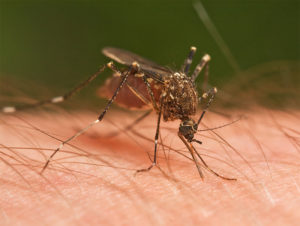 With mosquito season almost here, it’s important to take precautions against a potentially serious illness—West Nile virus. This widespread disease can be a threat to humans, animals and several species of birds in the U.S., particularly during the summer through late fall when mosquitoes are most active. Mosquitoes bite infected animals and then transmit the virus to people.
With mosquito season almost here, it’s important to take precautions against a potentially serious illness—West Nile virus. This widespread disease can be a threat to humans, animals and several species of birds in the U.S., particularly during the summer through late fall when mosquitoes are most active. Mosquitoes bite infected animals and then transmit the virus to people.
Symptoms
While more than three-quarters of people infected with West Nile virus won’t get sick, those over the age of 50 are particularly susceptible. According to the Centers for Disease Control’s website, those who experience the effects of West Nile virus may suffer flu-like symptoms such as fever, headache, body aches, nausea and vomiting. Some people also develop swollen lymph glands or a skin rash on the chest, stomach and back. In a few very severe cases, which usually require hospitalization, the patient may experience disorientation, tremors, convulsions, muscle weakness, vision loss, numbness and even paralysis or coma. In extreme cases, these symptoms are irreversible.
What We Can Do
Use an effective insect repellent diligently during mosquito season. Since mosquitoes are particularly active at dawn and dusk, wear long sleeves and long pants, or just remain indoors during these times. Eliminate standing water in buckets, barrels and unused flower pots on your porch or in your yard, and drill holes in tire swings so water can drain. Turn over kids’ wading pools when not in use, and change the water in pet dishes and bird baths every 48 hours. Make sure window and door screens are in good repair and that gutters are free of debris. Use netting over baby carriages and strollers.
Also, have authorities drain private or community swimming pools that are not in use, and cooperate with our local health department’s mosquito abatement program.
One More Caution From the CDC
Some bird species, such as crows and blue jays, are particularly susceptible to West Nile virus. If you find a dead bird on your property, don’t handle the body with your bare hands. Contact the local health department for instructions on reporting and disposing of it. For more information, visit www.cdc.gov/ncidod/dvbid/westnile/wnv_factSheet.htm.




